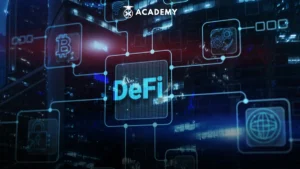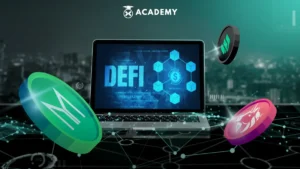Decentralized Finance (DeFi) is a financial system that operates on a decentralized network, and a single entity or organization does not control this network.
In addition, this network consists of decentralized nodes that work with each other to validate transactions and maintain the network. This network uses cryptographic techniques that make it resistant to censorship intrusions.
DeFi platforms and protocols use Blockchain technology and Smart Contracts to enable financial transactions and services.
The Role of Crypto In DeFi

Crypto assets use cryptography to secure their transactions and operate on a decentralized network such as Blockchain, which is not issued or controlled by a central authority.
In Decentralized Finance (DeFi), crypto assets play a central role in exchanging and storing value.
Crypto assets have characteristics that make them attractive in DeFi as they are decentralized and transparent, and transactions are fast and easy.
DeFi and Its Uses

In its use case, DeFi applications refer to ways in which DeFi protocols and platforms can facilitate financial transactions and services.
Here’s an example of using DeFi:
1. Borrow and borrow
Compound and Maker are DeFi protocols that allow users to lend crypto assets using smart contracts.
This protocol determines loans, such as interest rates and duration, and facilitates transactions on the Blockchain.
2. Transfers
Ripple and Lightning are DeFi protocols enabling fast and cheap cross-border cryptocurrency transfers.
3. The insurance market
Nexus Mutual and Augur are DeFi protocols that allow users to buy and sell insurance policies or participate in insurance markets using smart contracts.
The future of DeFi
Decentralized Finance (DeFi) has the potential to revolutionize the way financial transactions and services are done, such as eliminating intermediaries or third parties.
This leads to a more inclusive and efficient financial system that allows individuals and organizations to access it.
There are several ways in which DeFi has the potential to shape the future of finance, including:
1. Greater Access to Financial Services
DeFi applications make it easier for people in areas that don’t have access to finance because they can be accessed from anywhere.
2. Lower Cost
DeFi applications can reduce financial service costs by eliminating the role of third parties.
3. Increased Transparency
DeFi applications use transparent and open Blockchain technology, increasing the financial system’s transparency and trust.
DeFi Crypto Assets

In the project, several crypto assets support the DeFi ecosystem, including:
1. Maker (MKR)
Maker has its crypto asset, which is “MKR”.
Maker is a decentralized platform that enables stablecoins and crypto assets pegged to fiat currency.
2. Uniswap (UNI)
Uniswap has its crypto asset, namely “UNI”.
Uniswap is a decentralized protocol that allows the creation of liquidity pools for trading cryptocurrencies and other assets.
3. Compound (COMP)
Compound has its crypto asset, namely “COMP”.
Compound is a decentralized lending platform that allows users to earn interest on their crypto assets.
Conclusion:
1. DeFi platforms and protocols use Blockchain and Smart Contracts to enable financial transactions and services.
2. Decentralized Finance (DeFi) has the potential to revolutionize the way transactions and financial services, such as eliminating third parties.
3. While many DeFi projects are in active development and use, the specific features and capabilities of these projects will vary depending on the underlying technology.
In the following material, you will study and discuss basic learning material regarding “Non-Fungible Tokens (NFT)”.






